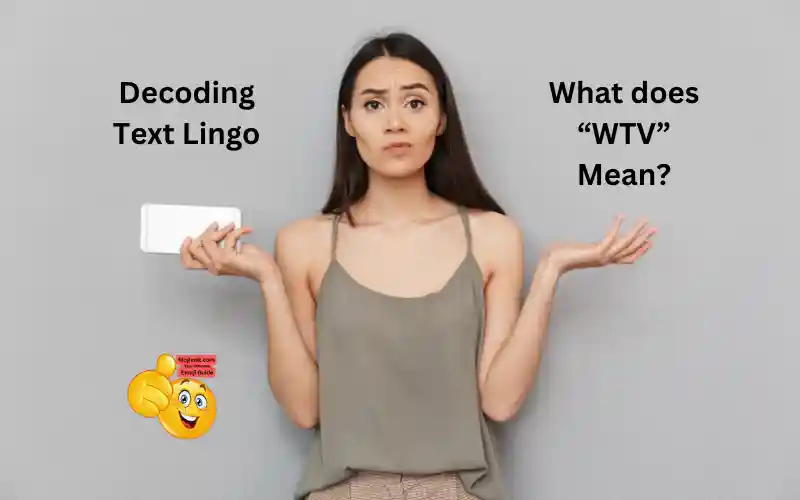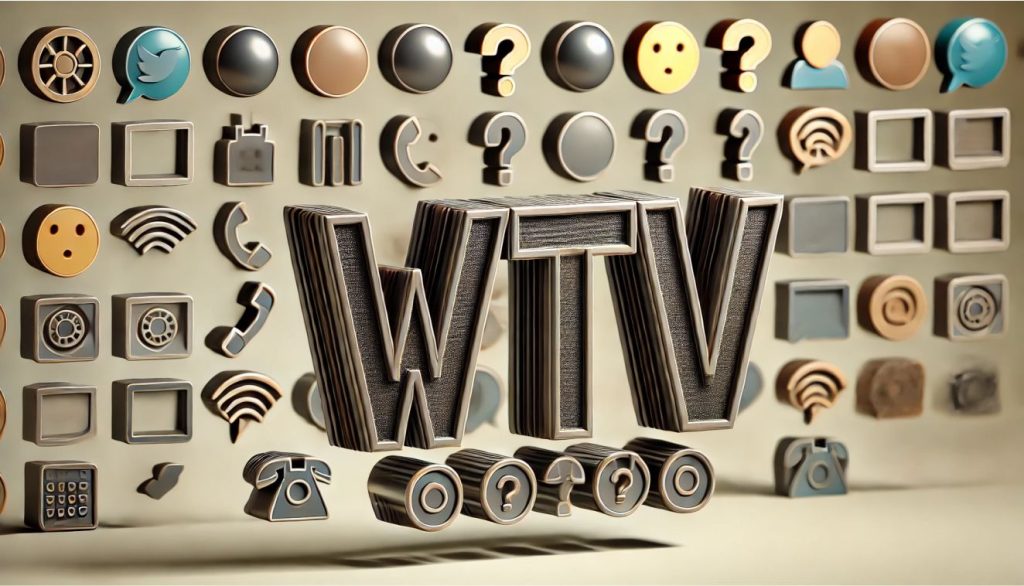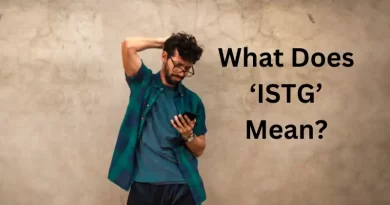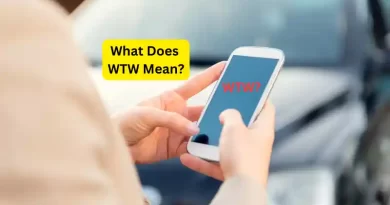Décoder "WTV" dans un texte : Qu'est-ce que cela signifie ?
Texting has become such a huge part of how we talk to each other nowadays. It’s so easy and fast to send messages by text. Because of that, there are a ton of little acronyms and abbreviations people use to make texting more efficient. But it could leave you confused about what some of them mean! So, what does WTV mean?
I’m about to try to figure out one of those acronyms – WTV and I’ll look at where it came from, how the meaning has changed over time, and the different ways people use it depending on the context. ‘WTV’ is a shortened version of ‘whatever’.
What Does WTV Mean?
It seems like it started getting used to texting and online chatting in the early 2000s. Back then it was mainly used as shorthand for whatever. So if someone was bugging you or said something you didn’t care about, you could just reply to WTV to blow them off.
WTV is commonly used on platforms like Snapchat to convey indifference or nonchalance.
Over time, the meaning expanded beyond just whatever in a dismissive way. As texting became more conversational, WTV started being used to continue a dialogue rather than shut it down. People would use it to acknowledge a point but not fully commit to a position. So it became more of a vague noncommittal response instead of outright dismissal.
"WTV" dans la culture populaire, les mèmes et les médias sociaux
|
Aspect |
Description |
|
Mèmes Internet |
Les mèmes "WTV" sont partagés avec humour sur les médias sociaux et mettent souvent en scène des personnages ou des symboles qui haussent les épaules. |
|
L'intégration dans la culture populaire |
Le terme "WTV" est apparu dans des émissions télévisées, des films et des paroles de chansons, reflétant son utilisation dans la communication quotidienne. |
|
Utilisation des médias sociaux |
Le terme "WTV" est largement utilisé sur des plateformes telles que Twitter et Facebook en réponse à des sujets d'actualité, à des nouvelles ou à des contenus humoristiques. |
|
Symbole de la communication moderne |
Il est devenu un symbole de la manière directe et simple dont nous communiquons en ligne, reflétant l'esprit de la génération Internet. |
WTV aujourd'hui
Nowadays, based on how I see it used, WTV has a few different meanings depending on the context. The two main ones seem to be:
-
A flippant or indifferent way to say whatever, like the original meaning. For example “WTV, I don’t care what you think about this.”
-
A more conversational I hear what you’re saying or sure, that’s valid when you don’t fully agree but don’t want to argue. For instance, WTV I see where you’re coming from but I think my point still stands.
Using ‘WTV’ can help keep the discussion cool and laid-back, making it easier to convey nonchalance and openness to whatever the other person suggests.
L'origine et l'évolution de "WTV"
Text messaging, an integral part of modern communication, has witnessed the birth of countless acronyms and abbreviations. “WTV” is one such acronym that has found its way into our digital chats. To understand its meaning better, let’s take a brief look at the historical context of text messaging and how “WTV” came into existence.
Contexte historique de la messagerie textuelle
The advent of text messaging may be traced back to the early 1990s when mobile phones started becoming more accessible to the general public. As texting gained popularity, people began seeking ways to convey thoughts and emotions more efficiently.
Acronyms and abbreviations emerged as a solution to the character limit imposed by early text messaging systems. The limitation spurred the creativity of texters, giving rise to a unique language that may convey complex ideas using a limited number of characters.
Emergence of Acronyms and the Abbreviation ‘WTV’
The evolution of texting culture led to the widespread use of acronyms and abbreviations to simplify communication. “LOL” (Laugh Out Loud), “BRB” (Be Right Back), and “OMG” (Oh My God) are some of the iconic examples that snuck into online and offline exchanges.
“IDK” (I Don’t Know) and “IDC” (I Don’t Care) are among the many acronyms that express uncertainty or indifference. And then, there’s “WTV,” which, much like its counterparts, serves a unique purpose in text messaging. ‘WTV’ is often used in chat to convey a relaxed or indifferent attitude.
Comment "WTV" a vu le jour
“WTV” is a product of the internet age, where shorter forms of words and phrases are embraced to save time and characters. It is an abbreviation of “Whatever,” and its purpose is to convey a sense of indifference, nonchalance, or dismissal. When someone responds with “WTV” to a question or statement, it often implies that they don’t care about the subject or don’t want to engage in a further discussion.
The abbreviation “WTV” is a reflection of the fast-paced, on-the-go nature of modern digital communication. It allows people to express disinterest or detachment with just three letters, making it a concise and efficient tool for conveying feelings.
Interprétations courantes de "WTV
“WTV” is a versatile acronym, and its meaning differs based on the context in which it is used. To help you grasp the diverse interpretations of the abbreviation, let’s explore some of its common meanings and provide examples of its usage in different scenarios.
‘WTV’ can also be used to signal that one is fine with any decision made.
Le classique "Peu importe"
“WTV” is most commonly shorthand for “Whatever.” It’s a quick and simple way to express indifference or nonchalance, much like shrugging your shoulders and saying, “I don’t care.”
Exemple :
Person A: “Are we having pizza or burgers for dinner?”
Person B: “WTV, I’ll eat anything.”
Here, Person B uses “WTV” to show they have no strong preference and are easygoing about the dinner choice.
Désintérêt ou licenciement
“WTV” may also signal disinterest or dismissal. When someone replies with “WTV” to a question or comment, it often means they don’t want to engage further or provide a detailed response. It’s a polite way to say, “I’m not interested.”
Exemple :
Person A: “I think the new superhero movie is going to be amazing.”
Person B: “WTV, I don’t follow superhero movies.”
Here, Person B uses “WTV” to politely express that they aren’t interested in the topic of superhero movies.
Remplissage de conversation décontractée
Sometimes, “WTV” is used as a filler in casual talks. It doesn’t necessarily imply indifference but keeps the chatter flowing in a relaxed manner.
Exemple :
Person A: “How’s your day going?”
Person B: “WTV, it’s been pretty chill. What about you?”
Here, “WTV” is used as a casual response, similar to saying, “Eh, just the usual.”
Exprimer un manque d'information
“WTV” may also indicate a lack of knowledge or information on a particular subject. It’s a way of saying, “I don’t know” or “I have no idea.”
Exemple :
Person A: “Do you know when the new album is dropping?”
Person B: “WTV, I haven’t heard anything about it.”
Here, Person B uses “WTV” to admit they don’t have any information on the album release date.
Le contexte est important
One of the fascinating aspects of “WTV” is how its meaning may change depending on the conversation’s context and tone. The same abbreviation could convey indifference, disinterest, or a lack of information, making it a versatile tool for texters to express themselves concisely. Understanding the vibe of a discussion can help in interpreting the meaning of ‘WTV’.
L'essor des mèmes sur Internet
In the age of memes and viral content, “WTV” has taken on a life of its own. Memes featuring “WTV” have emerged, often with animated images of people shrugging shoulders, embodying the essence of indifference that “WTV” conveys.
The memes are shared across social media platforms, serving as humorous responses to a wide range of scenarios. Whether it’s a funny comment on a social media post or a reaction to a bizarre news story, “WTV” memes are used to underscore a sense of nonchalance.
L'intégration dans la culture populaire
Popular culture is often a reflection of contemporary communication trends, and “WTV” is no exception. It has found its way into TV shows, movies, and even song lyrics. It’s used to portray characters as laid-back, unbothered, or detached in various contexts.
In some cases, characters in TV series might respond with a nonchalant “WTV” when confronted with trivial or annoying situations. The usage mirrors real-life interactions and further reinforces the prevalence of “WTV” in modern communication.
Médias sociaux et contenus courts
Social media platforms have embraced the brevity and informality of “WTV.” X (formally Twitter), in particular, is a hotbed for the acronym’s usage. People use “WTV” in tweets to express opinions on various topics, share humorous observations, or even react to trending hashtags.
Its presence in short-form content underscores how the abbreviation has become a staple in the toolkit of digital expression. It’s efficient, it’s relatable, and it’s an easy way to convey a range of emotions, from indifference to mild amusement.
Malentendus et clarifications
The brevity of text messages and the reliance on acronyms like “WTV” sometimes lead to misinterpretations. Let’s explore a few instances where “WTV” might be misconstrued and discuss strategies for resolving misunderstandings.
L'ambiguïté de "WTV"
One of the primary reasons for misunderstandings related to “WTV” is its inherent ambiguity. As we’ve seen, the acronym may convey various meanings, from indifference to dismissal. However, depending on the context and the relationship between the people conversing, it could be challenging to determine the precise intent behind its usage.
For instance, when someone responds with “WTV” to a heartfelt message, it may be perceived as indifference when the sender intended it to be a casual conversation filler. Similarly, when used in response to a question, it might be interpreted as a lack of interest, even if the responder meant it as a way to express a lack of knowledge.
Stratégies de clarification
To avoid misunderstandings related to “WTV” or any other acronym, clear communication is key. Here are a few strategies to help clarify its meaning:
-
Rechercher le contexte: If you receive a message containing “WTV” and you’re unsure about its intent, don’t hesitate to seek context. You could reply with a simple, “What do you mean by ‘WTV’?” That way, the person using the acronym could provide clarification.
-
Consider the Relationship: In casual conversations with friends, “WTV” is often used more lightheartedly. In professional or formal contexts, it’s wise to assume a more straightforward, indifferent meaning.
-
Ask for Confirmation: If the context remains unclear even after seeking clarification, consider asking for confirmation. You could say, “Do you mean you don’t care, or are you unsure about this?” It encourages the other person to specify intent.
-
Use Emojis: Emojis add emotional context to text messages. When “WTV” is followed by an emoji, it conveys the intended tone more clearly. For example, “WTV 😊” indicates a casual, nonchalant attitude, while “WTV 😒” might suggest disinterest.
-
Err on the Side of Politeness: When in doubt, err on the side of politeness. If you’re uncertain about the meaning of “WTV,” responding with a neutral, open-ended question or statement will keep the conversation positive and avoid potential misunderstandings.
La valeur d'une communication claire
While “WTV” and other acronyms have become essential tools in modern communication, they do come with the potential for confusion. Clear and open communication, combined with the consideration of context and relationships, should prevent misunderstandings and foster more productive conversations in the digital age.
"WTV" vs "IDC" vs "IDK" : Décrypter les nuances
Abréviations du texte and acronyms are the building blocks of efficient and concise communication. “WTV,” “IDC,” and “IDK” are among the most commonly used acronyms, each serving a distinct purpose. Let’s explore the subtle differences between the three acronyms and understand when and how to use them.
“IDC” – I Don’t Care
“IDC” is another widely used acronym, and it stands for “I Don’t Care.” Unlike “WTV,” “IDC” is more explicit in expressing a lack of interest or a disinterested attitude. When someone responds with “IDC,” it’s a straightforward way of saying that they do not care about the topic or situation.
“IDK” – I Don’t Know
“IDK” is short for “I Don’t Know.” The acronym is used when someone is unsure or lacks information about a particular subject. It’s not necessarily a response of indifference but rather an admission of a lack of knowledge. “IDK” is often used when someone is asked a question to which they don’t have a clear answer.
Nuances d'usage
Here’s a quick guide:
-
Use “WTV” when you want to convey a sense of indifference, nonchalance, or dismissal. It’s perfect for situations where you don’t have a strong opinion or don’t want to engage in a lengthy discussion. Additionally, “WTV” can also indicate that someone is bored or disinterested in the conversation.
-
Choose “IDC” when you want to explicitly express that you don’t care about a particular topic or situation. It’s a more direct way of conveying disinterest.
-
Opt for “IDK” when you want to admit that you don’t have the information or knowledge to answer a question. It’s a humble way of acknowledging uncertainty.
L'avenir de "WTV" et de la messagerie texte
As we conclude our exploration of the acronym “WTV” and its meanings in text messaging, let’s consider the role it plays in digital communication. What does the future hold for “WTV,” and how will it continue to impact our text conversations?
Efficacité et expressivité
The efficiency and expressiveness of acronyms like “WTV” continue to be valued in digital conversations. The abbreviations help us convey emotions, attitudes, and ideas quickly and succinctly. In a world where time is of the essence, they serve as valuable tools for maintaining the momentum of conversations.
The future of text messaging is likely to maintain the balance between the convenience of acronyms and the richness of traditional language. We should expect acronyms like “WTV” to remain prevalent in our daily interactions, especially in the fast-paced world of social media and instant messaging.
Conclusion : "WTV" - Une fenêtre sur la communication moderne
WTV isn’t just another acronym – it captures our culture and how we communicate in the 21st century. As we keep texting and chatting online, the shortcuts will definitely keep being a big part of how we get our thoughts across quickly and easily. They’re woven into the fabric of our conversations now.
Next time you see WTV pop up in a text or online, take a sec to appreciate it. It represents our ever-changing language and all the nuances of modern communication. It’s a little digital shrug that says a lot more than it seems.
Questions fréquemment posées sur WTV
"WTV" est l'abréviation de "Whatever". Il est couramment utilisé pour exprimer un désintérêt, un accord ou un rejet dans une conversation. Par exemple, en réponse à une question sur les préférences ou les opinions, on peut utiliser "WTV" pour indiquer l'absence de sentiments forts.
"WTV", comme de nombreuses abréviations, ne convient généralement pas à la communication formelle. Il est préférable de l'utiliser dans des messages personnels et décontractés ou sur les plateformes de médias sociaux.
Outre la signification la plus courante, "WTV" peut également signifier "Willing to verify" dans les forums commerciaux, "Waste to Value" dans le contexte de la gestion des déchets, et "Way to Victory" dans les communautés de joueurs.
Contrairement à d'autres acronymes qui sont généralement prononcés en énonçant chaque lettre individuellement, "WTV" est souvent lu ou prononcé comme "peu importe", ce qui en fait une abréviation phonétique.
Il existe des variantes comme "WTFV" (Whatever the Fuck vous dites) et "WTF" (What the Fuck). Ces variantes peuvent être considérées comme plus décontractées ou inappropriées dans certains contextes. Il est donc important de tenir compte du ton et du contexte de votre communication lorsque vous les utilisez.










